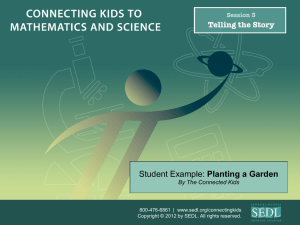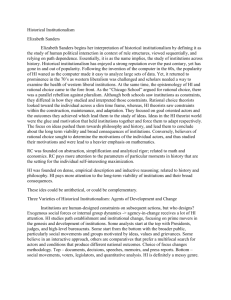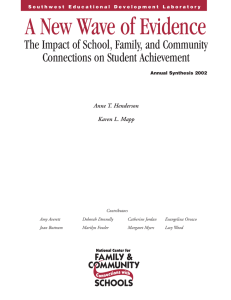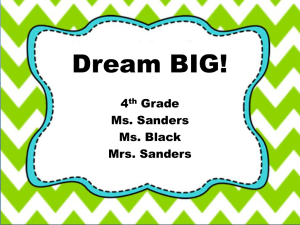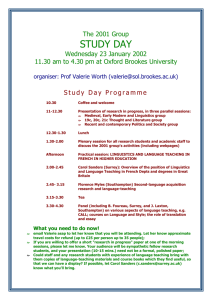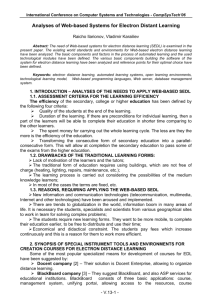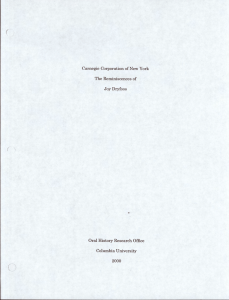A New Wave of Evidence: Key findings
advertisement
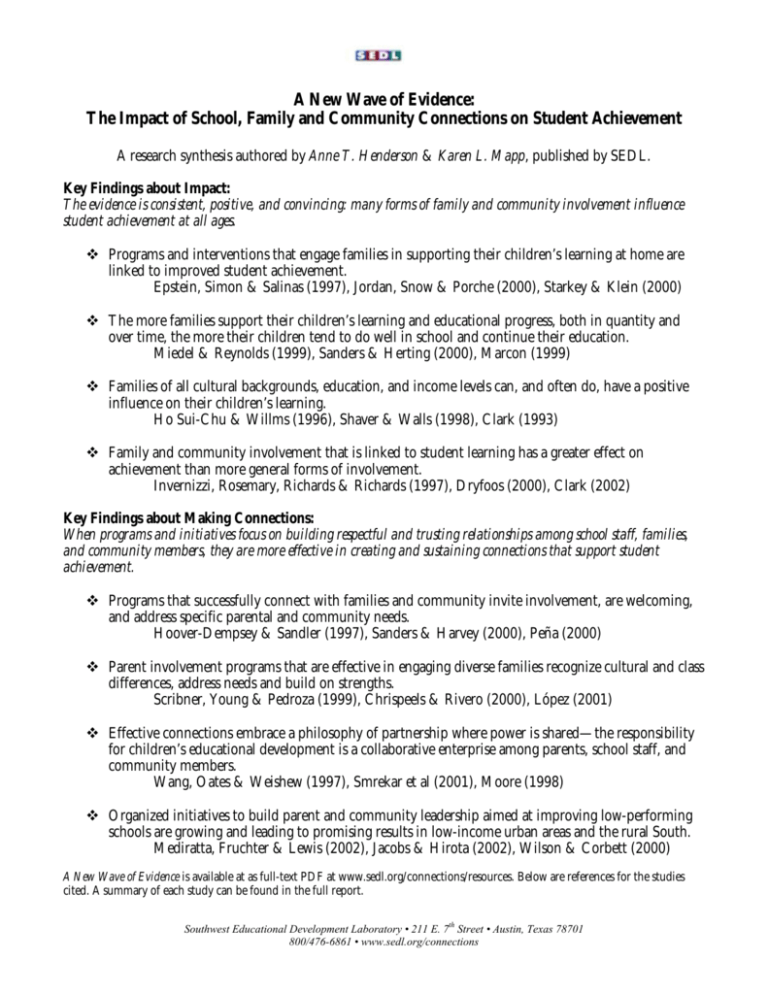
A New Wave of Evidence: The Impact of School, Family and Community Connections on Student Achievement A research synthesis authored by Anne T. Henderson & Karen L. Mapp, published by SEDL. Key Findings about Impact: The evidence is consistent, positive, and convincing: many forms of family and community involvement influence student achievement at all ages. Programs and interventions that engage families in supporting their children’s learning at home are linked to improved student achievement. Epstein, Simon & Salinas (1997), Jordan, Snow & Porche (2000), Starkey & Klein (2000) The more families support their children’s learning and educational progress, both in quantity and over time, the more their children tend to do well in school and continue their education. Miedel & Reynolds (1999), Sanders & Herting (2000), Marcon (1999) Families of all cultural backgrounds, education, and income levels can, and often do, have a positive influence on their children’s learning. Ho Sui-Chu & Willms (1996), Shaver & Walls (1998), Clark (1993) Family and community involvement that is linked to student learning has a greater effect on achievement than more general forms of involvement. Invernizzi, Rosemary, Richards & Richards (1997), Dryfoos (2000), Clark (2002) Key Findings about Making Connections: When programs and initiatives focus on building respectful and trusting relationships among school staff, families, and community members, they are more effective in creating and sustaining connections that support student achievement. Programs that successfully connect with families and community invite involvement, are welcoming, and address specific parental and community needs. Hoover-Dempsey & Sandler (1997), Sanders & Harvey (2000), Peña (2000) Parent involvement programs that are effective in engaging diverse families recognize cultural and class differences, address needs and build on strengths. Scribner, Young & Pedroza (1999), Chrispeels & Rivero (2000), López (2001) Effective connections embrace a philosophy of partnership where power is shared—the responsibility for children’s educational development is a collaborative enterprise among parents, school staff, and community members. Wang, Oates & Weishew (1997), Smrekar et al (2001), Moore (1998) Organized initiatives to build parent and community leadership aimed at improving low-performing schools are growing and leading to promising results in low-income urban areas and the rural South. Mediratta, Fruchter & Lewis (2002), Jacobs & Hirota (2002), Wilson & Corbett (2000) A New Wave of Evidence is available at as full-text PDF at www.sedl.org/connections/resources. Below are references for the studies cited. A summary of each study can be found in the full report. Southwest Educational Development Laboratory • 211 E. 7th Street • Austin, Texas 78701 800/476-6861 • www.sedl.org/connections References Chrispeels, J. H., & Rivero, E. (2000). Engaging Latino families for student success: Understanding the process and impact of providing training to parents. Paper presented at the Annual Meeting of the American Educational Research Association, New Orleans, LA.. Clark, R. (1993). Homework-focused parenting practices that positively affect student achievement. In N. F. Chavkin (Ed.), Families and schools in a pluralistic society (pp. 85–105). Albany, NY: State University of New York. Clark, R. (2002). Ten hypotheses about what predicts student achievement for African American students and all other students: What the research shows. In W. R. Allen, M. B. Spencer, & C. O'Conner (Eds.), African American education: Race, community, inequality, and achievement: A Tribute to Edgar G. Epps. Oxford, UK: Elsevier Science. Dryfoos, J. G. (2000). Evaluations of community schools: Findings to date. Washington, DC: Coalition for Community Schools. ED450204. http://www.communityschools.org/evaluation/evalprint.html Epstein, J. L., Simon, B. S., & Salinas, K. C. (1997). Involving parents in homework in the middle grades. Research Bulletin No. 18, 4 pages. http://www.pdkintl.org/edres/resbul18.htm Ho Sui-Chu, E., & Willms, J. D. (1996). Effects of parental involvement on eighth-grade achievement. Sociology of Education, 69(2), 126–141. EJ533315. Hoover-Dempsey, K. V., & Sandler, H. M. (1997). Why do parents become involved in their children's education? Review of Educational Research, 67(1), 3–42. EJ548327. Invernizzi, M., Rosemary, C., Richards, C. J., & Richards, H. C. (1997). At-risk readers and community volunteers: A 3-year perspective. Scientific Studies of Reading, 1(3), 277–300. Jacobs, L., & Hirota, J. (2002). Constituency building for public school reform. New York and Chicago: Academy for Educational Development and Chapin Hall Center for Children at the University of Chicago. Jordan, G. E., Snow, C. E., & Porche, M. V. (2000). Project EASE: The effect of a family literacy project on kindergarten students' early literacy skills. Reading Research Quarterly, 35(4), 524–546. EJ616175. Lopez, G. R. (2001). On whose terms? Understanding involvement through the eyes of migrant parents. Paper presented at the Annual Meeting of the American Educational Research Association, Seattle, WA. Marcon, R. A. (1999). Positive relationships between parent school involvement and public school innercity preschoolers' development and academic performance. School Psychology Review, 28(3), 395–412. Mediratta, K., Fruchter, N., & Lewis, A. C. (2002). Organizing for school reform: How communities are finding their voice and reclaiming their public schools. New York, NY: The Institute for Education and Social Policy, New York University. [This publication is a summary version of Mediratta & Fruchter, 2001.] Miedel, W. T., & Reynolds, A. J. (1999). Parent involvement in early intervention for disadvantaged children: Does it matter? Journal of School Psychology, 37(4), 379–402. EJ607658. Southwest Educational Development Laboratory • 211 E. 7th Street • Austin, Texas 78701 800/476-6861 • www.sedl.org/connections Moore, D. R. (1998). What makes these schools stand out: Chicago elementary schools with a seven-year trend of improved reading achievement. Chicago, IL: Designs for Change. http://www.designsforchange.org/pdfs/SOScomplete.pdf Peña, D. C. (2000). Parent involvement: Influencing factors and implications. The Journal of Educational Research, 94(1), 42–54. EJ615791. Sanders, M. G., & Harvey, A. (2000). Developing comprehensive programs of school, family, and community partnerships: The community perspective. Paper presented at the Meeting of the American Educational Research Association, New Orleans, LA. Sanders, M. G., & Herting, J. R. (2000). Gender and the effects of school, family, and church support on the academic achievement of African-American urban adolescents. In M. G. Sanders (Ed.), Schooling students placed at risk: Research, policy, and practice in the education of poor and minority adolescents (pp. 141–161). Mahwah, NJ: Lawerence Erlbaum Associates. Scribner, J. D., Young, M. D., & Pedroza, A. (1999). Building collaborative relationships with parents. In P. Reyes, J. D. Scribner, & A. Paredes-Scribner (Eds.), Lessons from high-performing Hispanic schools: Creating learning communities (pp. 36–60). New York, NY: Teachers College Press. Shaver, A. V., & Walls, R. T. (1998). Effect of Title I parent involvement on student reading and mathematics achievement. Journal of Research and Development in Education, 31(2), 90–97. EJ561992. Smrekar, C., Guthrie, J. W., Owens, D. E., & Sims, P. G. (2001). March towards excellence: School success and minority student achievement in Department of Defense schools (Report presented to the National Education Goals Panel). Nashville, TN: Peabody Center for Education Policy, Peabody College Vanderbilt University. ED459218. http://www.negp.gov/reports/DoDFinal921.pdf Starkey, P., & Klein, A. (2000). Fostering parental support for children's mathematical development: An intervention with Head Start families. Early Education and Development, 11(5), 659–680. EJ618579. Trusty, J. (1999). Effects of eighth-grade parental involvement on late adolescents' educational experiences. Journal of Research and Development in Education, 32(4), 224–233. EJ598231. Wang, M. C., Oates, J., & Weishew, N. L. (1995). Effective school responses to student diversity in innercity schools: A coordinated approach. Education and Urban Society, 27(4), 484–503. EJ511143. [Also published in 1997 in Haertel, G. D., & M. C. Wang (Eds.), Coordination, Cooperation, Collaboration (pp. 175–197), Philadelphia: The Mid-Atlantic Regional Educational Laboratory at Temple University.] Wilson, B., & Corbett, D. H. (2000). "I didn't know I could do that": Parents learning to be leaders through the Commonwealth Institute for Parent Leadership. Lexington, KY: Commonwealth Institute for Parent Leadership. http://www.cipl.org/pubs.html Southwest Educational Development Laboratory • 211 E. 7th Street • Austin, Texas 78701 800/476-6861 • www.sedl.org/connections

